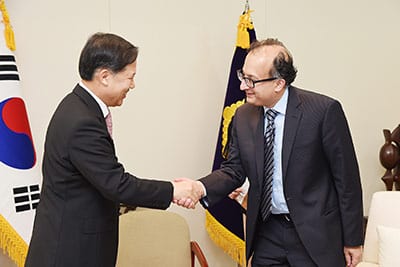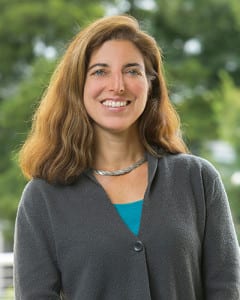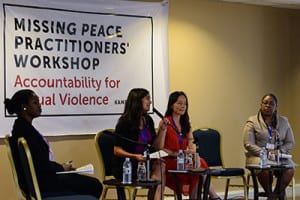
By Andrew Cohen
Berkeley Law buzzed with high-impact projects throughout 2015. A consistent change agent on pressing societal issues, the school honored its public mission, while making a difference in the Bay Area and internationally. Here are just some of the year’s highlights.
Startup fever
With more Silicon Valley companies moving to the East Bay, the school launched a timely initiative called Startup@BerkeleyLaw that gives students, entrepreneurs, investors, and attorneys access to top experts and programming on emerging legal issues for startups. The venture includes a partnership with San Francisco’s new Nasdaq Entrepreneurial Center that offers relevant courses—many taught by Berkeley Law’s renowned faculty in intellectual property (IP) law and privacy.
The program also aids companies in navigating tricky organizational issues that affect new ventures. Its arsenal includes the New Business Practicum, which helps launch emerging area startups; the new Berkeley chapter of InSITE, a national fellowship and mentoring program in which law and business students help startups develop products; and the Berkeley IP Lab, a new seminar-practicum course where students advise campus-affiliated startups on core IP issues.
“We’ve always tried to be responsive to what our students want and what’s happening in the real world,” said Professor Robert Merges, who oversees the course with patent attorney Vern Norviel. “Your head would have to be 20 feet under the Bay not to see that startup fever is thriving in our area.”
Privacy insights
 Another issue reaching fever pitch: online data security. With the growing threat of global hacking, it’s been unclear how resulting privacy regulations have shaped corporate behavior or protected personal data—until now. A new book by Professors Kenneth Bamberger and Deirdre Mulligan, sharing the findings of their five-nation study, provides best privacy practices and valuable guidance to policymakers.
Another issue reaching fever pitch: online data security. With the growing threat of global hacking, it’s been unclear how resulting privacy regulations have shaped corporate behavior or protected personal data—until now. A new book by Professors Kenneth Bamberger and Deirdre Mulligan, sharing the findings of their five-nation study, provides best privacy practices and valuable guidance to policymakers.
Berkeley Law also hosted the 2015 Privacy Law Scholars Conference, organized by Chris Hoofnagle, co-faculty director of the Berkeley Center for Law & Technology (BCLT). About 275 participants attended, and many sang the event’s praises. “If I could attend only one academic conference every year, it would be this one,” Georgetown Law Professor Paul Ohm said. “The conference’s impact goes well beyond the legal academy.”
Berkeley Law’s privacy and data security experts also discussed pressing issues with policymakers and attorneys at the Privacy Law Forum in Silicon Valley. Organized by BCLT, the gathering included privacy lawyers from major firms and business strategists from Intel, Google, Microsoft, Netflix, Oracle, and Facebook.
Global influence
The school’s IP work extends well beyond national borders, as evidenced by its U.S.-China IP Conference. Government officials and lawyers from both countries explored topics such as U.S.-China film co-production, new trends and legal issues in transnational technology investment, and cross-border IP enforcement.

The conference signaled a deepening relationship with China’s Renmin University, one of many collaborations between Berkeley Law and academic institutions and legal organizations in Asia. In June, Dean Sujit Choudhry spent two weeks forging those ties in Shanghai, Beijing, Tokyo, Taipei, Seoul, and Hong Kong.
With a growing number of alumni working with foreign lawyers on legal issues that cross international borders, Choudhry said “we need to think carefully about what this means for our students, and how we can equip them to thrive in the emerging multipolar world.”
Climate action
California has long stood at the forefront of combating climate change—with Berkeley Law a key player in developing the state’s innovative policies. Case in point: a report by Ethan Elkind, climate change fellow at Berkeley and UCLA law schools, on how California can increase its biofuel production as a way to switch from high- to low-carbon petroleum fuels. The report also explained other ways to reduce emissions, spur development of carbon-reducing byproducts, and reduce wildfire risk.

Elkind attended the United Nations Climate Change Conference in Paris with other campus environmental law experts. During that time, the Center for Law, Energy & the Economy released “Climate Actions For California: Recommendations for Governor Jerry Brown’s Final Term.” The report details steps for administration leaders, energy advocates, and other stakeholders to create short-term successes—and a foundation for long-term progress.
Berkeley Law also launched the new Environmental Law Clinic, which will build on the school’s enormous scholarly expertise in the field. Led by Claudia Polsky ’96, the clinic has accepted its first seven students and will initiate projects next semester. Priority areas include climate change mitigation, toxics reduction, and the human right to water.
Students will engage in sophisticated policy analysis, interview and counsel clients, and draft comments on proposed regulations. They will also consult with expert witnesses, conduct legal research and discovery, negotiate with third parties, draft legal documents, and give oral arguments in various hearings. “Both classroom and hands-on experience are necessary to grasp how environmental practice operates,” Eric DeBellis ’17 said. “This clinic will put students in a considerably better position to start their careers as practitioners.”
Racial justice
In February, Dean Choudhry formed a working group to identify initiatives the school could pursue to explore criminal, social, and racial justice issues surfaced by the killings of unarmed African Americans by white police officers. Berkeley Law created a website for faculty research and student opportunities to work on these issues. It includes an online portal, built by Professor Justin McCrary for the California Attorney General’s Office, that provides extensive information on arrests, violence against police, and deaths in police custody.
The school’s new Initiative to End Racial and Economic Disparities in Juvenile Justice, led by the East Bay Community Law Center (EBCLC), focuses on the collateral consequences of harsh school discipline policies and juvenile court debt. EBCLC Executive Director Tirien Steinbach ’99 said that one-two punch “keeps poor youth of color in a perpetual cycle of marginalization and criminalization.” The effort seeks to decriminalize school discipline in Berkeley and Oakland and create a model for school districts to reduce racial disparities in punishment.
Another EBCLC report—noting that one in six California drivers have had their driver’s licenses suspended because of minor traffic infractions that led to escalated fees, penalties, and court appearances—revealed the devastating and disproportionate effect on minorities. The report drew national media exposure and prompted state Chief Justice Tani Cantil-Sakauye to request emergency action to facilitate access to justice for those challenging traffic fines. The state legislature is also considering a bill that would enable people to regain their licenses more easily.
Victims’ rights
The Human Rights Center hosted a workshop in Uganda that convened representatives from several sectors that work with sexual violence survivors in Africa, in countries currently or recently embroiled in armed conflict. The center opened the event by presenting new research on this issue in a four-nation study. HRC Executive Director Alexa Koenig said the workshop allowed first responders “to share their expertise and strategies for improving the reporting, investigation, and prosecution of sexual violence.”

The International Human Rights Law Clinic (IHRLC) produced a searing report on female victims of sexual violence during social unrest in India—where nearly all institutions and state officials thwart victims’ efforts to seek justice. The report outlines specific steps India can take to achieve corrective action and legal reforms.
Another IHRLC report identified available remedies and provided a legal roadmap for people pursuing justice for killings by U.S. Customs and Border agents at the U.S.-Mexican border. “These agents have used force against people in unwarranted ways with no accountability,” said co-author Yasmin Emrani ’15. “We produced … a flow chart of sorts to determine the best legal strategy depending on the variables involved.”
Berkeley Law’s new Policy Advocacy Clinic, led by Clinical Professor Jeff Selbin, targeted the jarring rise of criminalizing homelessness in California with an eye-opening study. It sparked widespread media coverage, and became a key piece of the Right to Rest campaign that seeks to enact basic civil rights protections for homeless people. Selbin said the response “impressed on me once again how a great public law school can contribute to making the world a better place.”